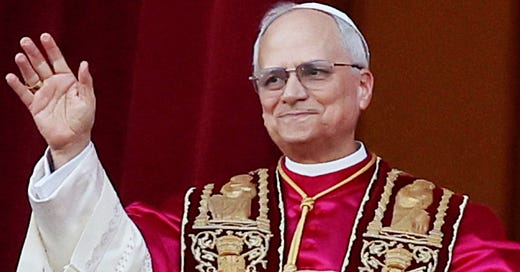Pope Leo is a global citizen
May the man with vast international experience help bring peace, justice and reconciliation
Those who elected the new pope could have chosen a man from Manila, a cardinal from Congo, or a steward from Stockholm. All of them have broader world experience than the popes who served before Pope John XXIII, a career Vatican diplomat, was chosen in 1958. However, on May 8, the College of Cardinals outdid itself, electing a man who is American by birth but most notable for being a global citizen.
Americans will rightly claim him as one of their own, but Pope Leo XIV could sing the old Johnny Cash standard, I’ve Been Everywhere, Man, without a shred of embarrassment. A citizen of both the United States and Peru, his ecclesiastical career has taken him to every corner of the globe. Those places he didn’t visit during his 12 years as prior general of the Augustinians, he helped to appoint bishops for during his most recent job as prefect of the Dicastery of Bishops.
Some say his acquaintances with bishops around the world led to his election as pontiff. More to the point, those friendships will help him govern the Church with a firm grasp of differing regional and local realities.
The former cardinal, Robert Prevost, spent nearly 20 years in Peru as a missionary and a bishop based in the country’s fourth largest city, Chiclayo. In Peru, he came to know the poor and share their lives. He walked the middle path in the country’s divided episcopal conference that is split between liberationists and followers of the conservative Opus Dei.
Pope Francis appeared to be especially fond of Prevost, entrusting him with the third most important position in the Vatican, and Prevost returned that fondness. Popes Francis and Leo are men of vastly different temperaments with Francis the prophet who rattled the windows of the staid Vatican while Leo labels himself the “faithful administrator.”
Prevost supported Pope Francis’ move to synodality, a position abhorred by some conservatives, but when he spoke publicly himself it was more on issues such as same-sex marriage and abortion. On the hot button issues of the day, he might himself appear to be a conservative, but he will surely continue to address the issues of global injustice in a similar spirit to that of the post-Vatican II popes.
His choice of the name Leo indicates his affinity for the modern Catholic social teaching that began with Pope Leo XIII’s 1891 encyclical Rerum Novarum which supported workers’ rights to form unions while denouncing both socialism and what we today call neoliberalism.
It is surely no accident that this globalist pope belongs to a religious congregation as did his Jesuit predecessor. Prior to Pope Francis, the last religious order pope was the reactionary mid-19th century pope, Gregory XVI, who battled modern innovations at every turn. However, in the last 60 years, religious orders have become prophetic leaders in the Church, dedicating themselves to the preferential option for the poor. They sent missionaries from the Western world to the Global South, people who returned home with a radically different view of the world and the Gospel. Prevost was one of those.
In their efforts at renewal in the wake of Vatican II, religious congregations went through a time of upheaval and uncertainty. They came out of that era with fewer members but with strong formation and maturity. Now, they are on the forefront of change in the Church.
A registered Republican in Illinois, Prevost can walk both sides of the aisle, talking with both progressives and conservatives. However, he is no supporter of Trumpian populism and its denigration of the rights of migrants and many other people. So far, he has used his account on X to draw attention to the voices of others who critique the growing injustices perpetrated by populism. Perhaps as pope, he will do something similar by highlighting the voices of people on the margins who our efficient, technologically oriented society ignores. This would be a new sort of teaching office, a magisterium of the masses rather than the solitary voice of one who “knows.” What a delightful change that would be!
I am getting ahead of what has happened. In his opening remarks on the loggia of St. Peter’s Basilica, Pope Leo spoke of peace and dialogue. He prayed for God to help us “build bridges, with dialogue, with encounter, uniting us all to be one people always in peace.” Those who know him say this is not empty rhetoric. He is a man who listens to all and who will confront the polarization of our times.
Pope Leo will not be a divisive pope but a unifier. That is what the Church and world need especially now as drones and fighter jets wreak havoc in many regions. May Pope Leo string the harp of peace and reconciliation. It will take a maestro to reconcile current conflicts. No person can do it alone. A full orchestra must play. But a pope whose first words were “Peace be with all of you” at least knows which symphony he will be conducting.




